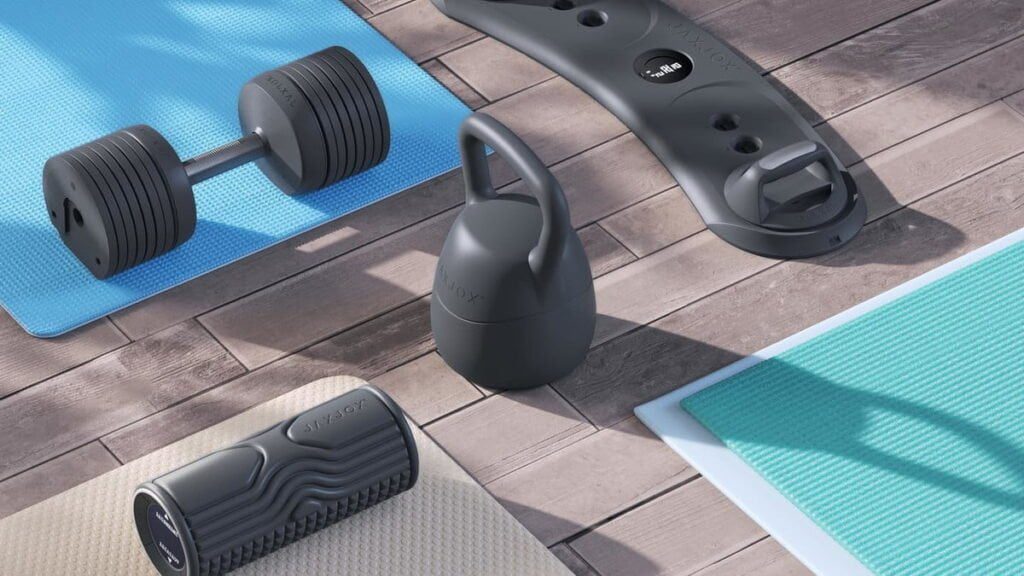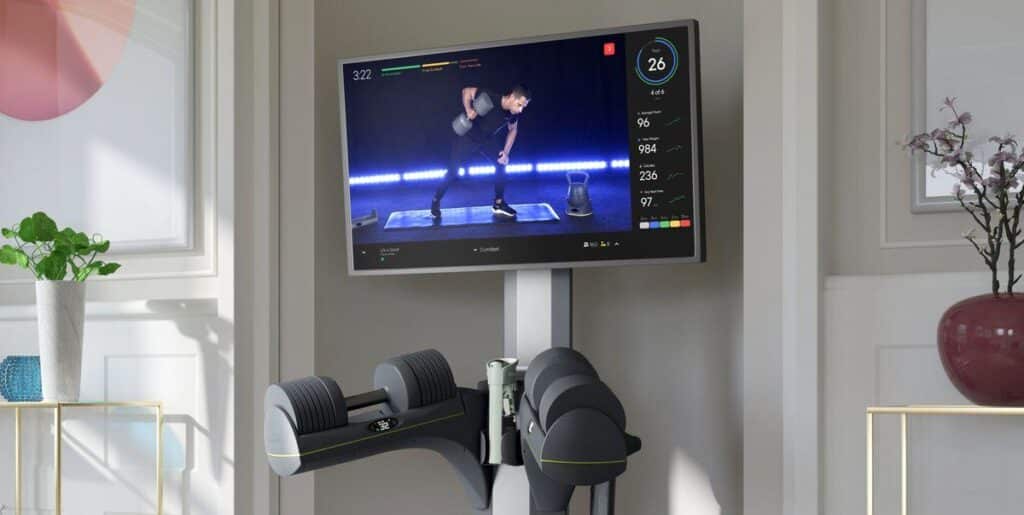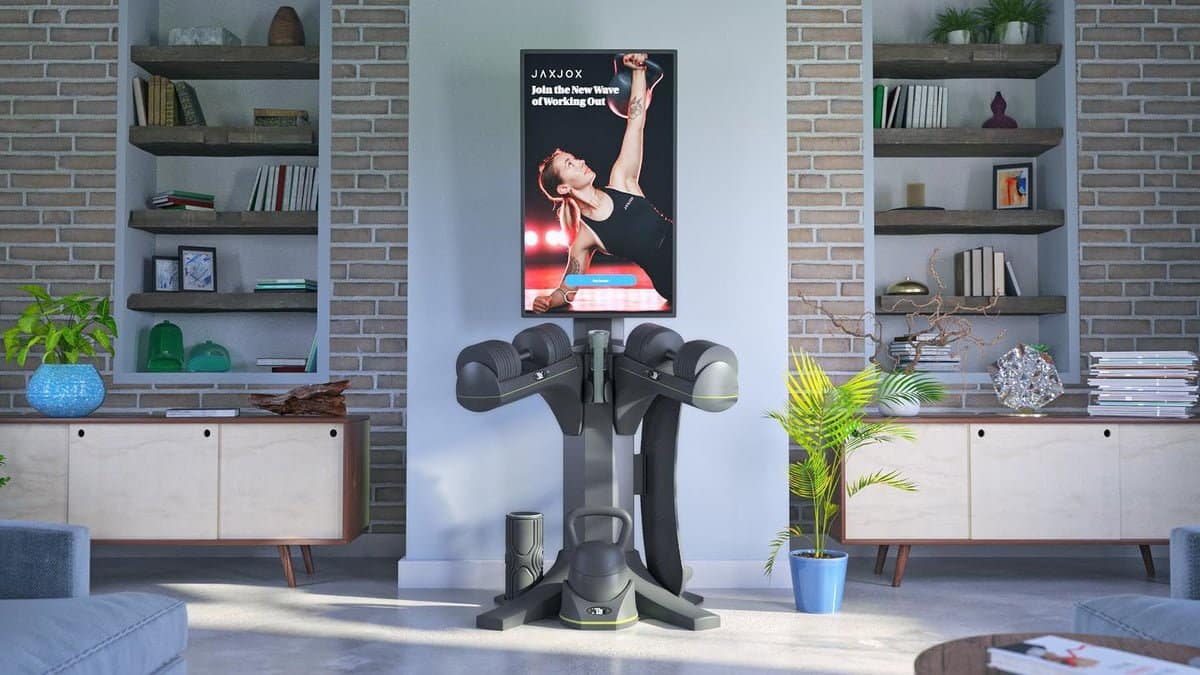After Peloton for the exercise bike, JaxJox takes a step forward by offering an all-in-one home gym.
In essence, the situation means that an often forgotten piece of exercise equipment in the corner gives way to a “must have” piece of high technology like an iPhone. Why the boom in fitness technologies? Since its founding in 2012, Peloton has achieved a market capitalization of more than $37 billion and a level of ubiquity that makes it a touchstone in fitness circles. If JaxJox manages to capture a similar slice of the market, it will turn the tables on the gym of the future.
The omnipresent coach
JaxJox promises “a 360-degree fitness experience.” The founder the company, Stephen Owusu is enthusiastic about the force monitoring concept developed by his company. In the gold rush to quantify every outdoor fitness activity, from jogging to swimming to cycling, no one has yet managed to do strength monitoring convincingly, he says.
“Everyone who uses a dumbbell today is just picking up a dumbbell, doing a few reps that count in their head, and that's it. There are no dumbbells on the market that can monitor strength, except those from JaxJox.”

What is JaxJox?
The JaxJox solution is a paradigm of what the indoor fitness of the "gym of the future" can become: a mixture of intelligent hardware and software. At CES 2019 it presented its KettlebellConnect. It's a smart kettlebell that packs a gyroscope, an accelerometer, and five different weights that connect through a smart automated locking system.
Today, JaxJox is ready for the big leap: a complete home gym setup boasting a 43-inch touch TV and a smart, coordinated set of equipment. The full package, currently available for pre-order with first shipments in December 2020, is astronomical compared to that of a gym. If we adopt as a reference a gym that costs €50 per month for membership, it is the equivalent of 3 years. $2.199. To these, a subscription fee of $39 per month must be added. And this brings me to the next reflection.
The gym is evolving
If, a few years ago, you wanted to build your own home gym, you had to buy a lot of equipment: maybe three or five or eight different dumbbells, some kettlebells, a number of other things. It would have taken a lot of space. Many have given up, many have bought few things, many have put them aside. The gym of the future also means versatility, and these tools provide us with an example of this. A DumbbellConnect has 14 dumbbells in one unit. A KettlebellConnect has six kettlebells in one unit. These are mechanics which in their current state would not support mass use like that of a gym. But for a family unit they are something very solid.
Anyway, obviously, a dumbbell is a dumbbell. And most of them cost much less than what JaxJox charges. As neat as the idea of several dumbbells in one unit may be, it's not the big selling point. The real value proposition is in the software. This is what could make JaxJox a winner in a very competitive market. The future is to offer users not only monitoring, but also personal coaching.
The JaxJox algorithm is built in such a way that it doesn't just take data when using a tool. If you go for a walk, or even if you sleep, the system collects data and uses it to organize the user's physique. He can recommend a whole day of rest, or a greater or lesser load, always obtaining the maximum result, at the best time. A kind of Spotify of the body.
The model will also allow for on-demand (or live streaming) sessions of daily lessons to cover everything from cardio to proper physical recovery. In other words, an entire temple of the physicist brought directly home.
End of the gyms?

I don't expect gyms to die, but that more and more people will exercise more elsewhere. This yes. And the most popular gym of the future will be at home. The most recent trigger is, of course, the COVID-19 pandemic. As places where large numbers of people gather and share equipment, gyms have been temporarily closed in many parts of the world. Many more people now work from home, which means they probably exercise at home too. Add to that the boom in subscription service spending and JaxJox's business model is starting to make sense.
However, I believe that, as with other things, the coronavirus has not changed so much the way in which physical fitness is treated, but has accelerated the processes in place. The trend towards networked products was already there. Covid simply accelerated it. All things considered, anticipating the future by three, perhaps five years.
And it is a circle that closes formidably, if you think about it. Technology has allowed us to carry out invaluable productivity tasks without leaving our desks. The solution to all this inaction? More technology, whether it's a smartwatch that tells us to get up and move at regular intervals or a screen that guides us through exercise.


